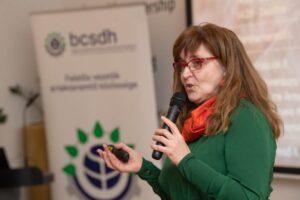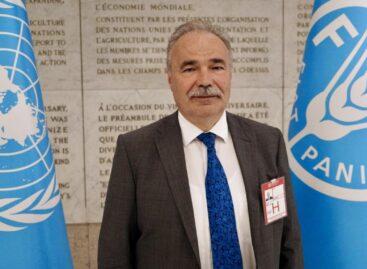You can’t do it alone – BCSDH Sustainability Partner Search event to achieve net zero goals
The world faces three critical challenges: the climate emergency, the loss of natural diversity and growing social inequalities. Systemic changes are needed instead of isolated measures, which requires deep and comprehensive cooperation across sectors, but also between economic actors.

(Photo: BCSDH)
The Hungarian Business Council for Sustainable Development (BCSDH), recognizing the opportunities inherent in synergy and partnership, which its membership of 132 leading companies can provide, organized its private Sustainability Partner Search for the second time on January 24, 2023, in order to speed up carbon-neutral operations and system-level processes. , which was hosted by UniCredit Bank. Joining the Race to Zero initiative, at the event organized in cooperation with the British Embassy, 20 companies presented their sustainability products and services, and then they could meet in informal discussions with the 30 companies that were looking for sustainability solutions to meet the goals of net zero. On behalf of UniCredit Bank, the participants were welcomed by Giacomo Volpi, Deputy President and Chief Executive Officer.

Paul Fox, ambassador of the United Kingdom to Hungary
“I am happy to be a part of this event organized by companies, for companies. This proves that net zero goals make business sense and that businesses can play a role in driving the clean energy and economic transition.” – pointed out Paul Fox, the ambassador of the United Kingdom to Hungary, in his opening speech.
The most popular topics were energy efficiency, green energy, and circular economy solutions, but carbon footprint calculation and digital and financial solutions helping to achieve carbon neutrality were not far behind.

Irén Márta, executive director of the BCSDH
“The program clearly shows what the most pressing challenges are for companies. Significant progress has been made in setting net zero goals even in one year, as our latest Towards Net Zero research conducted together with Deloitte shows that the number of companies committing to carbon neutrality has doubled. At the same time, carbon neutrality goals often do not include actual, measurable, scientific GHG emission reduction commitments, so there is still a long way to go.” – said Irén Márta, the executive director of the BCSDH, in her welcome speech. – “The research also pointed out that there is still a lot of uncertainty, a lack of knowledge is typical and often the allocation of resources within companies is not appropriate. The main incentives for companies to reduce emissions are maintaining or increasing competitiveness and complying with regulations. By presenting opportunities and good examples in this area, BCSDH can best help its member companies and the wider business environment.” – added Irén Márta.
It is an important step forward that the BCSDH’s 2023 focus topic, the protection of biodiversity, as well as services related to regenerative agriculture, nature-based carbon neutralization and sustainable water management have already appeared this year.
More than half of the world’s GDP depends on nature and its services. In other words, it affects all actors and companies, so everyone has a responsibility and an opportunity to act.
Related news
Farmers are being helped against drought with free water fees, water retention and irrigation modernization
While the government supports farmers by assuming the water service…
Read more >The government provides irrigation water to farmers for free
The government provides irrigation water to farmers for free by…
Read more >Climate change is one of the biggest risks to food security
Our country is reducing the challenges caused by droughts and…
Read more >Related news
What makes us add the product to the cart – research
The latest joint research by PwC and Publicis Groupe Hungary…
Read more >Energy drinks are now legal: what every shopkeeper should know
New regulations on the sale of energy drinks came into…
Read more >Tens of millions with one opening tab – the biggest prize draw in XIXO history has started
This summer, XIXO is preparing for a bigger launch than…
Read more >






